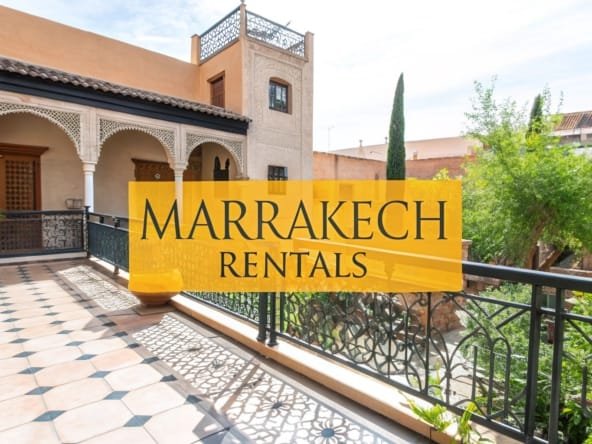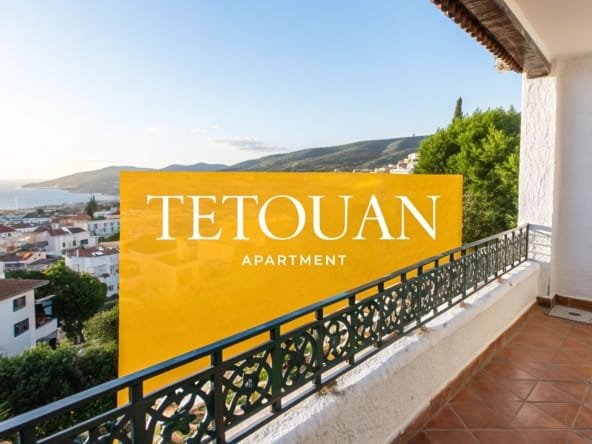Think of the certificat de propriété as the ultimate legal passport for your property in Casablanca. It’s not just a piece of paper; it’s the definitive, government-backed proof that you are the sole, undisputed owner. In a bustling market like Casablanca's, this document is your shield, protecting your investment from legal challenges and ownership disputes down the line.
Getting to Grips with the Certificat de Propriété in Casablanca
So, what exactly is this certificate? In Morocco, all things land and property registration run through a single, central authority: the Agence Nationale de la Conservation Foncière, du Cadastre et de la Cartographie (ANCFCC). This agency issues the certificat de propriété, which consolidates all the critical legal details of a property onto one official document. The result is a clean, unchallengeable title.
This isn't just bureaucratic paperwork; it's a vital tool in Casablanca's fast-paced property scene. With Morocco's urban population hitting over 65% in 2023, the pressure on housing in major cities is immense. This high demand makes rock-solid legal documentation more important than ever for secure transactions.
What's Actually on the Certificate?
Every certificat de propriété contains specific, standardized information designed to establish clear ownership and prevent fraud. Here’s what you’ll find on it:
- Titre Foncier (Property Title Number): This is the unique identifier for your property, like a national ID number. It's the most critical piece of data, connecting the physical land or apartment to its official legal file at the ANCFCC.
- Owner's Identity: The certificate clearly lists the full, legal name(s) of the owner or owners, leaving no room for ambiguity.
- Property Description: You'll find a detailed breakdown of the property's specifics, including its precise address, total area (in square metres), and official boundaries.
- Legal Status: This section is crucial. It details any active encumbrances against the property, such as a mortgage (hypothèque), a lien, or any other third-party claim.
Before we dive deeper, let's summarise the core function of this certificate with a quick table.
Key Aspects of the Certificat de Propriété
| Feature | Description & Importance |
|---|---|
| Legal Proof of Ownership | This is the single, authoritative document recognised by Moroccan law that proves you own the property. |
| Unique Identification | The Titre Foncier number ensures your property is uniquely identified within the national registry, preventing duplication or fraud. |
| Transparency of Burdens | It discloses any financial or legal claims (like mortgages or liens), providing a clear picture of the property's legal health. |
| Transaction Security | Essential for any sale, purchase, or financing. Banks won't issue a mortgage without it, and buyers won't close a deal. |
Understanding these elements is the first step toward navigating the property market with confidence. A clean certificate is your key to a smooth transaction.
A certificat de propriété with no outstanding liens is your golden ticket. It gives you the legal certainty that banks require for mortgage approvals and that savvy buyers demand before even considering an offer.
Whether you're looking to buy, sell, or simply ensure your family's assets are secure, getting familiar with this document is non-negotiable. For those just starting their property search, our guide on what to expect when looking for a home in Casablanca provides excellent background information to get you started on the right foot.
Getting Your Application Documents in Order
From my experience, I can tell you that the single biggest reason for delays in getting a certificat de propriété in Casablanca is a simple mistake with the paperwork. It’s frustrating, but it's true. Getting your documents right from the very start is the best way to make sure the whole process goes smoothly.
At the heart of your application are two key items: a copy of your CIN (national ID card) and the property’s Titre Foncier, which is its unique title number. The ANCFCC uses your CIN to confirm who you are, so the photocopy needs to be sharp and clear. The Titre Foncier is how they find your property in their massive database—get that number wrong, and you're going nowhere.
Your Essential Document Checklist
Before you even think about heading to the ANCFCC office, make sure you have these items perfectly prepared. Trust me, it saves a world of hassle.
- The Correct Application Form: Always grab the latest version from the official ANCFCC website. They sometimes update the forms, and using an old one is an easy way to get your application sent back.
- A Clear Photocopy of Your CIN: Make sure both the front and back are copied. If any detail is blurry or hard to read, it’s an automatic rejection.
- The Titre Foncier Number: Double-check this number and write it clearly on the application form. It's the unique identifier for your property's file.
A Quick Tip from Experience: Before you leave the house, hold your CIN photocopy up to a window or a light. Can you read every single word and number? Is the photo clear? This simple five-second check has saved my clients countless return trips and weeks of waiting.
The official ANCFCC portal is your best friend in this process. It’s the only place you should go for forms and official information.
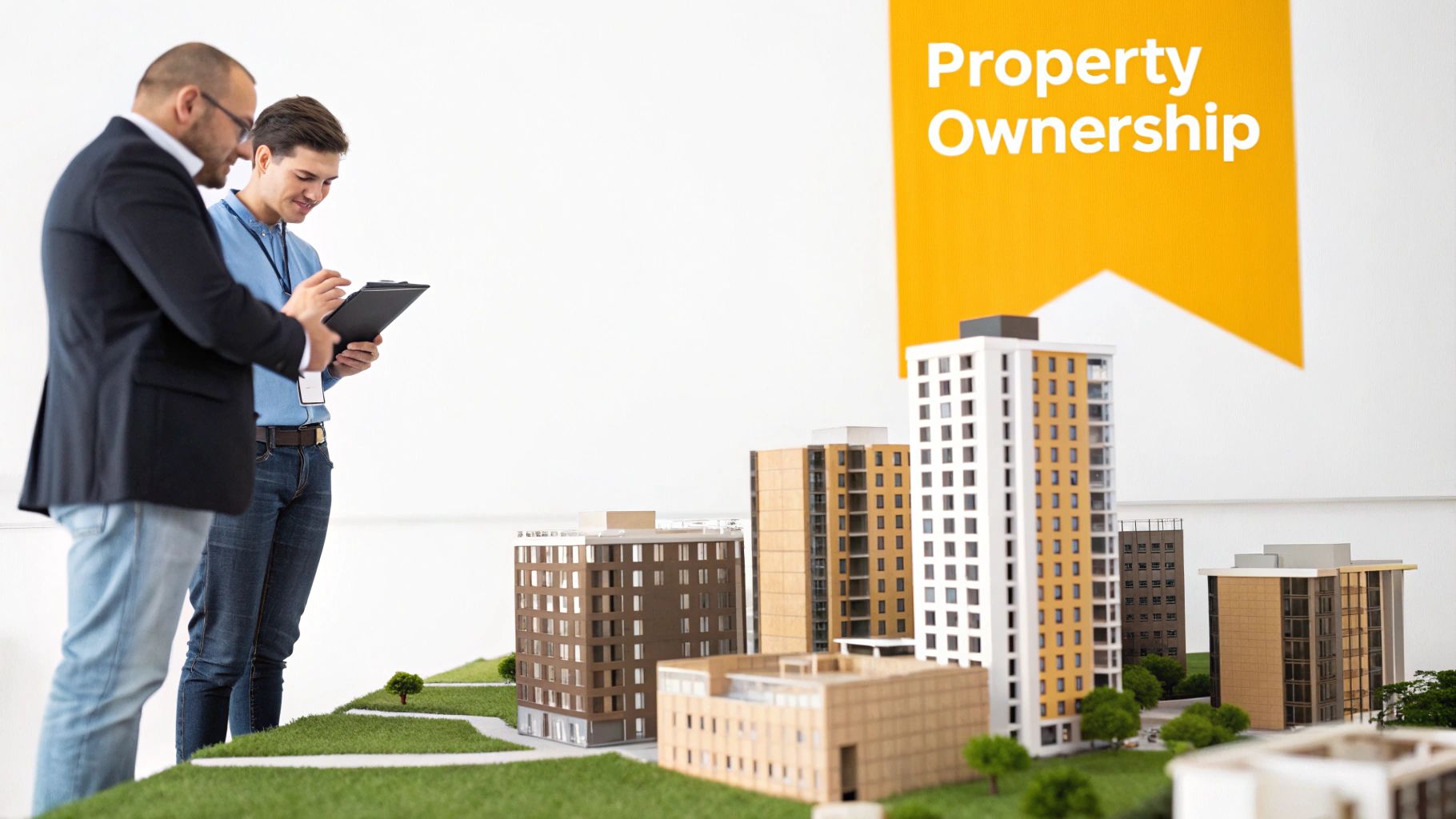
This is the homepage of the ANCFCC. I recommend spending a few minutes just looking around the site. Getting familiar with where to find things, especially the "E-services" or "Formulaires" sections, ensures you're always working with the most up-to-date and official documents for your application.
A Practical Guide to the ANCFCC Office in Casablanca
Let’s be honest, walking into the Agence Nationale de la Conservation Foncière, du Cadastre et de la Cartographie (ANCFCC) for the first time can feel a bit intimidating. But it doesn't have to be. With a little preparation, applying in-person for your certificat de propriété in Casablanca is actually quite manageable. The secret is knowing the process before you even step through the door.
When you arrive, your first task is to find the right guichet (service desk). You'll see different windows for various services—information, submissions, payments, and so on. Look for the sign that says "Dépôt de Dossiers" or "Demande de Certificat de Propriété." If you’re not sure, don't hesitate to ask a staff member; they’re used to it.
A personal tip: try to go on a weekday morning. The offices get noticeably busier in the afternoons, and a morning visit can save you a significant amount of time.
This visual breaks down the essential documents you’ll need to have with you.
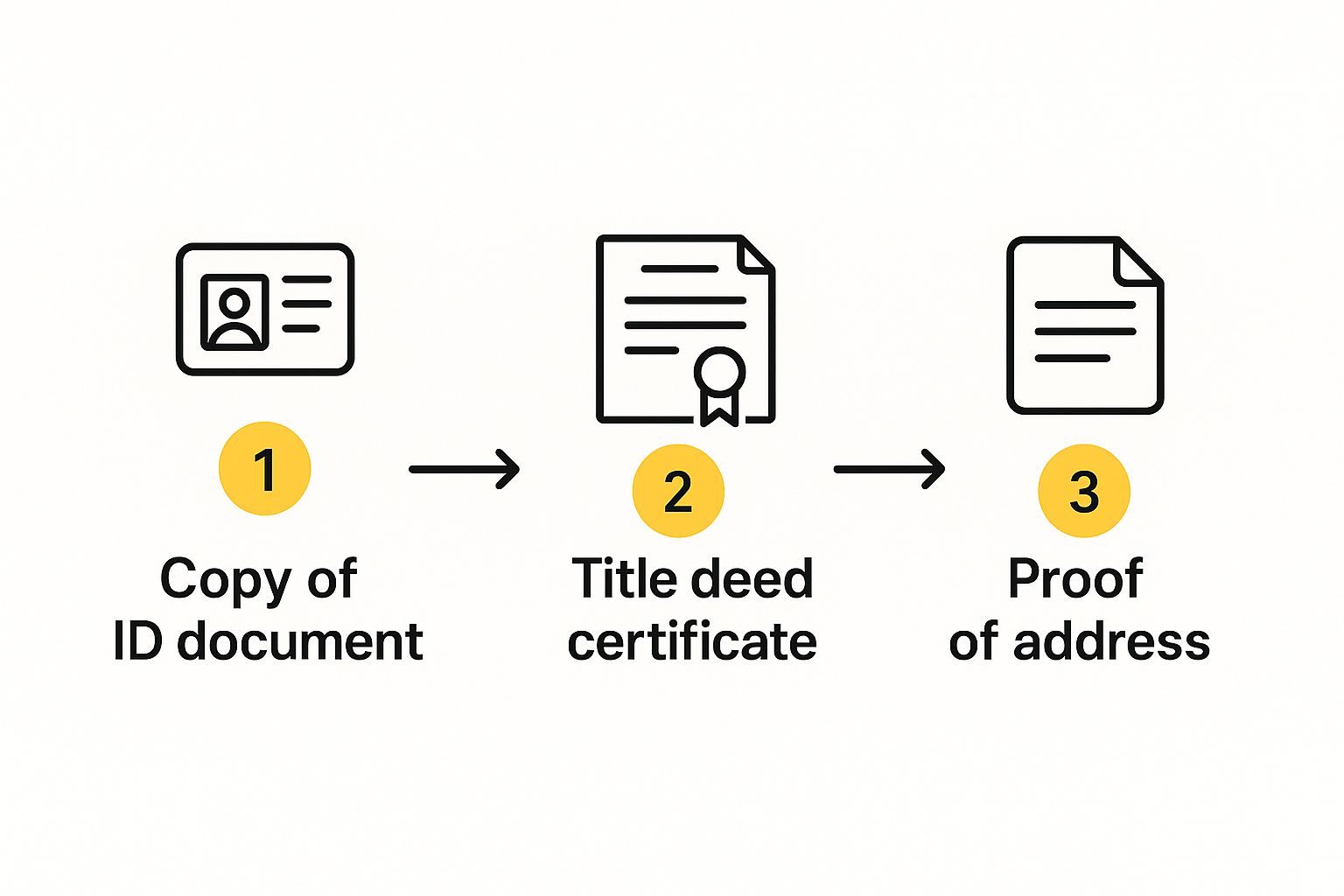
Having these items—a clear copy of your ID, the property's title number, and proof of your address—ready to go will make your time at the service desk much smoother.
Submitting Your Paperwork and Handling Fees
Once you’re at the correct window, you’ll hand over your application form and the supporting documents. The agent will give them a quick look to make sure everything is there. Assuming it's all in order, they'll point you toward the payment window, known as the caisse, to pay the fee.
The cost for a new certificate is a standard administrative fee. Here’s a quick breakdown of what you can expect in terms of costs and timelines.
Fee and Timeline Breakdown
| Item | Details |
|---|---|
| Certificate Fee | The standard issuance fee is 100 MAD. This is a fixed administrative cost. |
| Processing Time | Typically 2 to 5 business days. This can vary based on the specific branch's workload. |
| Collection | You will need to return to the same office with your payment receipt to collect the certificate. |
This table gives you a clear picture, helping you plan accordingly.
After paying, you’ll receive a receipt.
Crucial Tip: Guard that payment receipt with your life. It’s not just proof you paid; it has the reference number you’ll use to track the application and, critically, to collect your final certificate. You cannot get your document without it.
With the payment made and receipt in hand, your work is done for the day. The agent will give you a rough idea of when to come back, which is usually just a few business days. This kind of administrative efficiency is one of the reasons we find that Casablanca is Morocco's hottest real estate hub, as the city’s processes are built to support its fast-paced property market.
Simply keeping your documents organised and knowing the workflow will turn your trip to the ANCFCC from a stressful chore into a simple, successful errand.
What to Expect After You Submit Your Application

Once your documents and payment receipt are handed over, the waiting game begins. It’s easy to feel like your request has vanished into a bureaucratic void, but rest assured, the ANCFCC is usually quite diligent behind the scenes, verifying your details against their central registry.
Typically, you can expect your certificat de propriété in Casablanca to be ready in about two to five business days. This timeline isn't set in stone, though. The workload at that specific branch or a string of national holidays can cause minor delays. Simple issues, like a slightly unclear name on the application, might also add a day or two as they cross-reference their records.
Checking on Your Application Status
The best way to follow up is simply to go back to the ANCFCC office after a few days have passed. The key to this entire step is your payment receipt—don't lose it!
Head to the collection window (guichet de retrait) and present that receipt. An agent will use it to locate your file and either give you a status update or, hopefully, hand you the completed certificate. It's a system that works, albeit one that relies heavily on that single piece of paper.
The Final and Most Critical Step
When the agent hands you that fresh, official document, you’re almost done. But this next part is arguably the most important. Before you even think about leaving the counter, take a moment to review the certificate right then and there.
A Proactive Tip from Experience: Scrutinise every single detail. Check the spelling of all names, the Titre Foncier number, the property's address, and the registered surface area. If there’s a mistake, pointing it out immediately is usually a quick fix. Discovering an error months down the line? That can turn into a frustrating and time-consuming correction process.
Taking just a couple of minutes for this final review ensures your legal proof of ownership is flawless from the start. It's a small step that provides immense peace of mind and saves you from a world of potential headaches later.
How to Use Your New Certificate of Ownership
So, you've successfully navigated the process and now have your certificat de propriété in hand. This isn't just a piece of paper—it's the key that unlocks the true financial potential of your Casablanca property. Think of it as upgrading your asset from a simple, static holding to a dynamic tool for wealth creation.
Unlocking Financing and Investment Opportunities
For many property owners, the first practical use is securing financing. Moroccan banks are notoriously thorough. If you're looking to get a mortgage or tap into your home's equity, the first thing they'll ask for is undeniable proof of ownership. Your new certificate is exactly that.
It provides a clear, legal picture of your ownership and details any existing claims (hypothèques). This gives lenders the security they need to move forward with your application. Without this document, getting a loan against your property is a non-starter.
A Powerful Edge in the Rental Market
The certificate's power extends directly into Casablanca's bustling rental scene. Whether you're aiming for a long-term tenant or tapping into the high-demand short-term rental market, this document gives you instant credibility. It proves to prospective tenants and booking platforms alike that you are the legitimate owner with the authority to lease the property.
In a competitive market, this simple verification can make all the difference. For instance, Casablanca currently has around 1,297 active Airbnb listings. Analysis from platforms like Airbtics.com shows that top-tier properties can pull in over $1,651 a month, with the median sitting at about $622. Having your legal paperwork in order, starting with the certificat de propriété, is the bedrock for achieving those kinds of returns.
Your certificat de propriété acts as both a key and a badge of honour. It's the key that opens the door to bank financing and the badge that proves your credibility to high-quality tenants.
Ultimately, this certificate is an essential part of a smart investment strategy. It’s a critical piece of the puzzle for anyone serious about real estate and highlights why Morocco’s real estate market is worth your attention, especially for investors seeking real growth.
Answering Your Key Questions About the Property Certificate
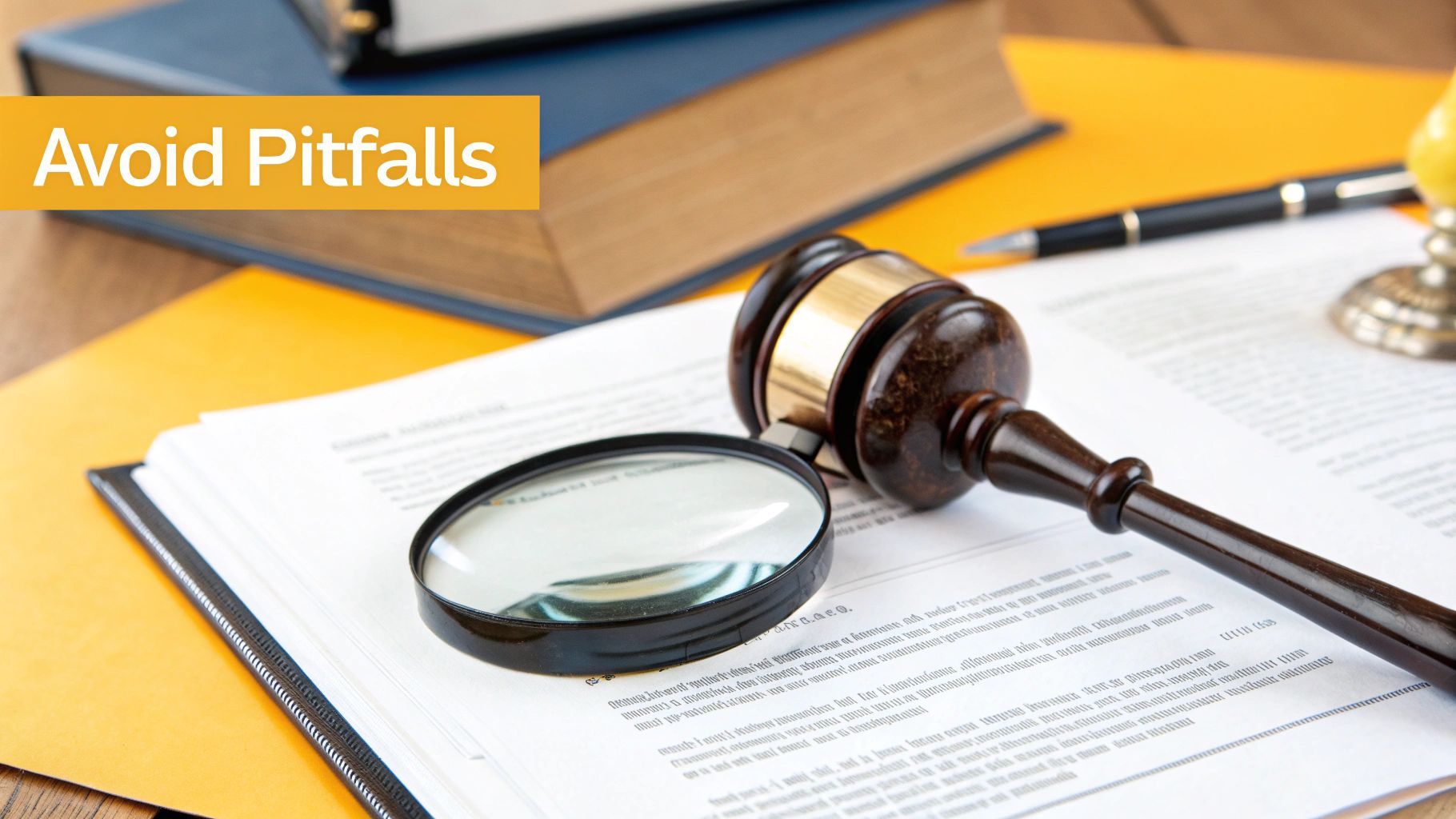
When you're dealing with something as significant as a property purchase in Casablanca, it’s completely normal to have questions. Getting to grips with the paperwork can feel a bit overwhelming, but understanding the key documents puts you in a much stronger position. Let’s clear up some of the most common points of confusion I hear from clients.
A frequent question I get is, “What’s the real difference between the Titre Foncier and the certificat de propriété?” It’s a great question. The simplest way to think about it is that the Titre Foncier is like your property’s permanent ID card—a unique number that never changes in the land registry. The certificat de propriété, on the other hand, is the official, time-stamped document that proves you are the owner and details the property's exact legal status at that moment.
Another area of uncertainty often revolves around foreign ownership. Can a non-Moroccan get a certificat de propriété? The answer is a clear yes. Moroccan law fully allows foreign nationals to purchase titled property (bien titré), which means you can—and must—obtain the ownership certificate through the exact same process as a Moroccan citizen.
What to Do If Your Certificate Is Lost or Outdated
So, what if the worst happens and you misplace your certificate? First, don't panic. You can request a duplicate from the same ANCFCC office that issued the original. The process is straightforward and follows the same steps as your initial application.
It's also crucial to know when to get a new certificate. While the document itself doesn’t have an expiry date, it must be re-issued any time there's a significant change to the property’s legal standing. This includes events like:
- Securing a new mortgage (hypothèque) against the property.
- Clearing an existing mortgage (mainlevée).
- Selling the property to a new owner.
Think of your certificat de propriété as a snapshot. It perfectly captures the legal state of your property on the day it was printed. For it to be a reliable document, that snapshot needs to be current.
This is more important than ever. With property values in Casablanca and other major hubs steadily climbing due to infrastructure development and high demand, a current certificate is essential for protecting your investment. To get a better sense of these market dynamics, you can read more about Morocco's 2025 real estate trends.
Navigating the Moroccan property market requires expert guidance. At Rich Lion Properties, we provide the local knowledge and support you need for a smooth and secure transaction. Let us help you with your next property move.

